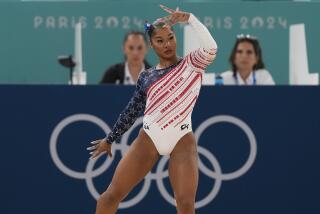Cuba Leaves No Question of Gilt : Medal count: Its boxers lead a 17-victory surge for a 140-130 edge over the United States in the gold race.
HAVANA — Cuba hauled in 17 gold medals Sunday to close 17 days of competition in what the president of the Pan American Sports Organization called ‘the best Pan American Games in history.”
Mario Vasquez Rana, president of the organization, had nothing but praise for the Cuban organizers who staged the biggest Pan American Games yet, contested by 4,500 athletes from 39 countries in North, South and Central America and the Caribbean. Vasquez Rana said he had been searching for problems during the games, but “these problems have been zero,” he said.
Cuban boxers dominated the finals Sunday, even more so than did the American swimmers competing on the other side of town.
Cuba finished with its best performance in the Pan Am Games: 140 gold medals, 62 silver and 63 bronze, for a total of 265. Its previous record total was 175. The United States had 130 gold, 125 bronze and 97 silver for a total of 352 medals. The team’s overall performance ranked second only to its record total of 369 in 1987.
Cuban television charted the medal race throughout the day, and by midafternoon, even before the swimming competition began, it hailed Cuba as the Pan American Games “champion.”
Vasquez Rana quipped: “The gold medals--since they are heavy--don’t want to travel. So they have stayed home.”
At a news conference Sunday morning, Robert Helmick, U.S. Olympic Committee president, was peppered with questions about the U.S. “failure” here. Helmick noted that Americans won more total medals than anyone else.
“We’re very pleased with our performances here,” he said. “We are the largest delegation (with 725 athletes). Because we are a large nation, we won more medals. We congratulate Cuba for their stand on gold medals.
“We think this has been a very fine competition. We are very proud of our athletes here. It’s been a very successful competition for the United States.”
In fact, the games were so successful for Cuba and the United States that their dominance has caused concern within Vasquez Rana’s organization.
“This is a major problem for us,” he said. “We believe that we have to help the other countries more. It is a serious problem that there is not a better distribution of medals.”
It would be difficult to persuade the Cubans that winning medals is a problem. For more than three years, the energy of this nation has been harnessed to the Games. “Volunteer” brigades worked around the clock to finish construction on the seven new facilities. Existing buildings were upgraded.
The Cuban effort was impressive. A USOC delegation that toured the sites in January had come away skeptical that the work would be finished on time. Helmick had singled out the swimming complex--containing the first enclosed pool in Cuba--as a potential problem. He said he would consider it a miracle if the pool was ready for the Games.
With national resources concentrated on the construction, miracles occurred. The facilities have ranged from excellent to adequate; because of poor building materials and the rush of construction, the skepticism now centers on whether the new facilities will last long enough for the Cuban public to enjoy them.
The Games lacked the usual catastrophe or controversy that has so characterized these quadrennial events. Drug testing, a lightning rod for mayhem, was no factor. Up to Sunday, four athletes were announced as having tested positive--two who inadvertently used stimulants, one shooter who used a tranquilizer and, Saturday, a basketball player who tested positive for cocaine.
There is no internationally accredited testing facility in Cuba. The testing for the Games was done with machines brought in from Mexico and Barcelona, Spain. Still, Vasquez Rana praised the procedures, which he said processed 1,000 tests.
“This is the best lab we have had in any Games--Pan Ams or Olympics,” he said. “This is, of course, the best lab we have set up in any games until now.”
Much was said at Sunday’s final news conference about the sacrifices made by the Cuban people; many citizens went without basic services while 20,000 visitors were made comfortable. Air-conditioners in the tourist hotels were never turned off, while whole sections of Havana were without power. Food and fuel were rationed.
The president of the organizing committee noted this when he declared that the greatest victory for Cuba was that the island had been portrayed on international television in a positive light.
If the hidden agenda of international sport is a promotion of national values, then Cuba’s sacrifices have been rewarded.
More to Read
Go beyond the scoreboard
Get the latest on L.A.'s teams in the daily Sports Report newsletter.
You may occasionally receive promotional content from the Los Angeles Times.







